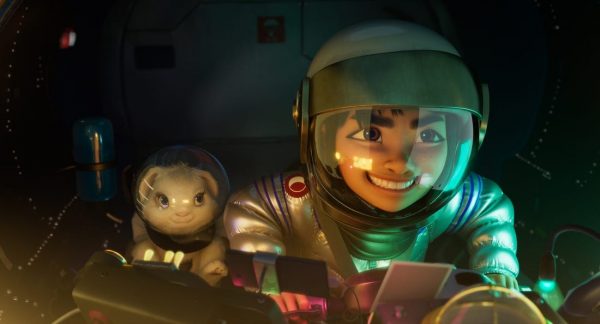Oscar winning composer Steven Price has worked on everything from broad canvas blockbusters to globetrotting documentaries. In a career which embraces every genre with distinction he is a composer moved by emotion, defined by personal preference and inclined towards layered arrangements. He took time out recently to talk to Martin Carr about his latest projects Over The Moon and David Attenborough: A Life On Our Planet.
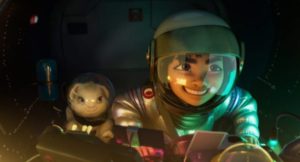
Over The Moon embraces both K-Pop and musical theatre, where you think orchestral elements fit into that mix?
Firstly I noticed how stylistically diverse the existing songs really were, so for me my job was about making that feel like one seamless journey. Allowing these songs to take centre stage while my score weaved in and out of them. On a broader level it was also about taking audiences by the hand and leading them on this emotionally dramatic journey with Fei Fei.
To what extent did the setting influence your choice of instruments?
One of the first conversations with the film makers centred on that because Over The Moon is rooted in Chinese culture. One thing they were keen to do is not go down that clichéd film route, where you have a Western orchestra with a solo instrument floating over the top. A lot of my work is very textual anyway so I really just took that approach. By recording Chinese instrumentation earlier on then stretching and manipulating that, I was able to employ these sounds and textures that I had built up from Chinese sounds which weren’t really recognisable. When I began writing over the top of them it would hopefully subconsciously influence the chords and harmonies I used. My hope in doing this was that you would feel China was the central core of my score, without it bashing you over the head in that clichéd cinematic way.
How did you represent Fei Fei’s character journey musically?
The key thing I was told early on when the director Glen Keane and I were watching this film, is that everything is in the eyes. So if audiences are looking through Fei Fei’s eyes throughout this film that is where my focus needed to be musically. We start off in China with this bustling family all around us, who are constantly over lapping and interrupting each other. In those sequences the music is very busy and themes are constantly superseding each other. Then as we begin our journey to the moon things slowly gain in clarity, as little hints of her eventual theme gradually come to prominence dramatically throughout the film. Of the two main themes involving Fei Fei, both her own smaller piece and a secondary composition which would come to represent Lunaria, it became about bringing them together. Purely because I think it is them coming together and her ability to accept this new situation that really drives this film forward.
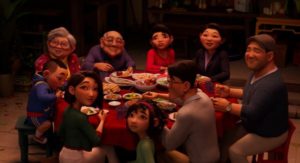
Over The Moon subtlety explores the impact of loss and renewal. Thematically how intrinsic were they to your score?
I think it was always a case of being very honest to that thematically and not shying away from it. There was a key moment early on during the scene when Fei Fei is outside hanging lanterns with her father, which features a simple piece of music we called the home theme. It was one of those moments where you put it in and I knew that if the directors didn’t like that I was in trouble. Solely because that was my personal response to their film. Luckily Glen’s first response was positive and he insisted we needed to use that, because it made him feel like he was at home with his family. Once I knew we were on the same page emotionally I could really be honest every time we dealt with those issues and avoid trying to second guess them. There are certainly moments later in the film when we are inside the chamber of exquisite sadness, which was a five minute sequence about the absence of everything that really resonates with that. However it was one those projects where everything was on the screen for me to just extract and hopefully elevate through my contribution.
Why do you think folk tales are so creatively enduring?
At the heart of them I think they are just so applicable to lots of different situations. You have the moon goddess who pushes away that thing she holds most dear and suffers for all eternity. For me there are so many things which can be applied to that. In Fei Fei’s story she cares so deeply for her mother that it seems impossible to imagine a world where that person no longer exists. With these stories there is a lesson to be learned, where ultimately people will always carry that sadness with them but emotionally endure. Hanging that on the folk mythology immediately makes that accessible to so many people and metaphorically opens this story up on a universal level.
To what extent do you think Over The Moon bridges the gap between a Pixar character study and Disney musical?
I think it has elements of all those things in there. What I loved about how Glen worked on this was his ability to remain true to what he personally wanted to see. There are all sorts of approaches in this film including two dimensional hand drawn animation during the mythology sequences, which brings you into one sort of world. A sort of hyper-real China which changes the minute it heads to the moon. It felt to me like a really bold film in that this refused to be any one thing. One of the things which excited me so much came about during an initial meeting, where they showed me all these visuals of Lunaria. I was introduced to this bizarre world of neon with amorphous things floating around all borne from tears shed by the moon goddess. I remember there was one meal where I had gone to see Glen and we were just walking from place to place and he was talking about these images from Lunaria. I said at the time it sounded like nothing I had ever seen before so my music needed to reflect that, to which he just stopped and nodded as if giving his approval. Which was great because then I went off with this sense of support and understanding, knowing that when it came to the music he would genuinely engage.
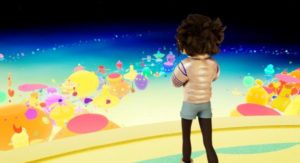
To what extent is composition the equivalent of capturing lightening in a bottle?
I think there is absolutely something to that and it is one of the most addictive elements about my work. The fact is I can write a piece of music that works, see a bit of film separately which I feel connected to, but until I put them together its sheer guess work. Not one moment passes which doesn’t feel like a conversation between myself and the picture. I will write a piece of music early on in the process before they have shot it for example, but until I see how they have lit that scene it is impossible to know whether the music works. The longer you do this the more you realise those assurances are never coming. It is just this brilliant job where you could have any sort of thought and it might be the thing which completely unlocks that film. It might be a blend of instruments, a chord sequence or a little melody and when it happens you just know. Everything lights up and it feels like speaking a different language almost. Those are the moments you are pushing for really and they come very rarely, but when they do happen it makes the job worthwhile.
In terms of communicating with film makers what techniques have you applied when putting across ideas personally?
I think you just find your way and everyone is different. Sometimes it’s not expecting anything from that situation before you go in, because some directors are comfortable talking about music and very literate in that respect. The most satisfying occasions for me are often when directors are outside their comfort zone. On this film for example there were moments I would put a piece of music in and it didn’t quite hit the spot for Glen. He couldn’t tell me why through music but explained it through his artwork and the feelings he had when creating these characters. He then went into reasons why their hair or eyes were drawn a certain way and his instincts behind that, which also answered all my questions around music. Neither of us could have expressed it in the other one’s language but we found a commonality. Animation is also very suited to the way I like to work because it is a layered process, both in terms of filmmaking and music composition. A lot of the time I am doing a piece of music then another layer of visuals will arrive alongside that, which changes the music and opens up this dialogue.
Your career has encompassed everything from tent pole blockbusters to documentaries including David Attenborough: A Life On Our Planet. What is it about certain projects which compels you to sign on?
In order for me to be at my best on any project it must be something I would personally like to watch. There were things I did early on in my career where that mantra wasn’t followed quite so much and it became harder work for it. I tend to like stuff which has emotional elements and gravitate towards wherever that is happening. The film which has just come out with Sir David covers the course of his life as he watched our world slowly crumble. It is an incredibly emotional piece of work particularly as he is staring straight down the camera telling you his experiences, in a way which is genuinely unique. I would definitely watch that so to write music for it seemed very natural to me.
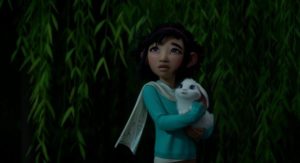
Would you say the film is almost a visual autobiography?
Absolutely. He refers to it as his witness statement. He really started doing this to show the world to people back at the beginning of commercial flights. He is one of the few people who saw it when the world was relatively untouched, then tracked the damage over decades. To hear him talk about it and seeing the coral bleaching or ice caps melting brings it home a lot more than any random commentary could ever manage.
How does your creative approach correlate between two seemingly opposing projects such as David Attenborough: A Life On Our Planet and Over The Moon?
It’s the weirdest thing to try and explain but essentially I hear things when watching films without music. A style will just announce itself to me and even though I might not be right the first time, my responses to that initial idea will produce something else. One of the things I like about my job is that you can go from something quite serious with chamber music to Over The Moon. One day I could be writing a Sorcerer’s Apprentice type thing for two rabbits making a potion, followed by a scene involving a lassoing space alien. All those days feel completely natural to me because you are responding to the emotions which are there. One of the great joys I think is that everything is different.
Can you describe for me your perfect Sunday afternoon?
I would probably be watching a film, but nowadays my kids are at the tail end of the years when they want to spend any time with us. So if we can get a good film on and all huddle up on the sofa that will do me. Then there might be a glass of wine and a delicious Sunday dinner afterwards. Food, drink and family would be it.
Many thanks to Steven Price for taking the time for this interview.
Over The Moon and David Attenborough: A Life On Our Planet are available to stream on Netflix now.



